
-
Find the right food for your petTake this quiz to see which food may be the best for your furry friend.Find the right food for your petTake this quiz to see which food may be the best for your furry friend.Featured products
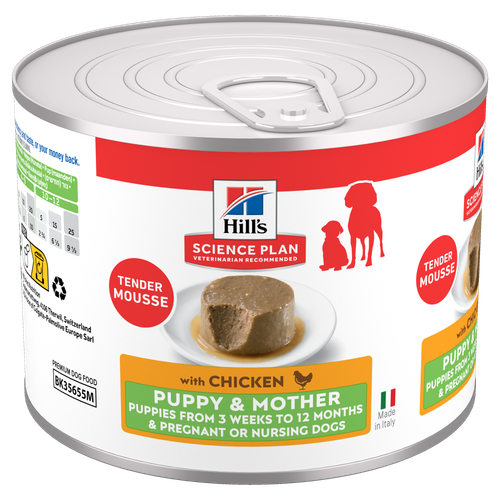 Puppy & Mother Tender Mousse Dog Food
Puppy & Mother Tender Mousse Dog FoodHill's Science Plan Puppy & Mother Tender Mousse Dog Food with Chicken is a complete premium pet food for puppies and pregnant or nursing dogs. Formulated with chicken and other specially selected ingredients, including minerals and antioxidants to support gut health and optimal growth, it comes in a soft mousse texture they'll love.
Shop Now Perfect Weight Small & Mini Adult Dog Food
Perfect Weight Small & Mini Adult Dog FoodHill's Science Plan Adult Small & Mini Dog Food with Turkey is a complete premium pet food for adult small dogs from 1 year old that are prone to weight gain or slightly overweight. This deliciously smooth mousse is formulated to deliver the appropriate amount of energy to support weight maintenance in adult dogs.
Shop Now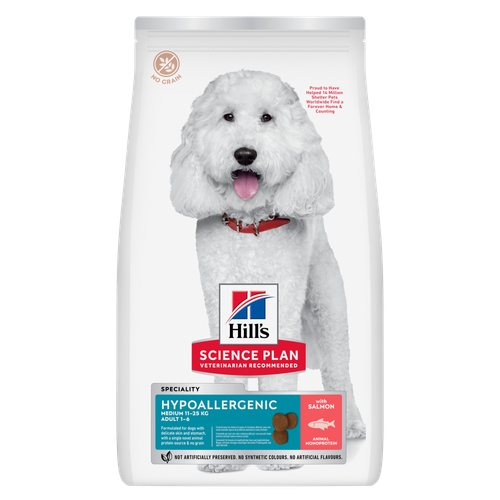 Hypoallergenic Medium Adult Dog Food
Hypoallergenic Medium Adult Dog FoodScience Plan Hypoallergenic Medium Adult dog food with Salmon is a gentle, science-led formula crafted for dogs with food sensitivities. Made with carefully selected, high-quality novel proteins and no grains, it’s tailored to minimise common triggers that can lead to skin and digestive discomfort.
Shop NowFeatured products Oral Care Adult Cat Food
Oral Care Adult Cat FoodHill's Science Plan Oral Care Adult Cat Food with Chicken contains clinically proven kibble technology to reduce plaque & tartar build up.
Shop Now Hypoallergenic Dry Cat Food
Hypoallergenic Dry Cat FoodHILL'S SCIENCE PLAN Hypoallergenic Adult cat food with egg & insect protein is a complete pet food for adult cat 1–6 years old. It's formulated for cats with delicate skin and stomach, with limited high quality novel protein sources & no grain.
Shop Now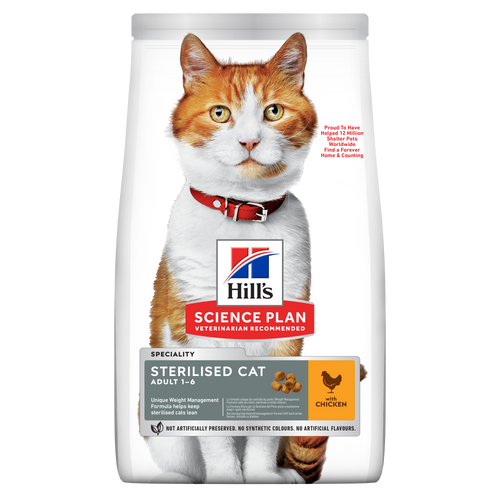 Sterilised Adult Cat Food
Sterilised Adult Cat FoodHill's Science Plan Adult Sterilised Cat Dry Food with Chicken is specially formulated with ActivBiome+ Multi-Benefit Technology. It is a precisely balanced nutrition, tailored to meet the needs of sterilised cats, to help keep sthem lean & healthy.
Shop Now -
Dog
- Dog Tips & Articles
-
Health Category
- Weight
- Food & Environmental Sensitivities
- Urinary
- Digestive
- Joint
- Kidney
-
Life Stage
- Puppy Nutrition
- Adult Nutrition
- Senior Nutrition
Cat- Cat Tips & Articles
-
Health Category
- Weight
- Skin & Food Sensitivities
- Urinary
- Digestive
- Kidney
-
Life Stage
- Kitten Nutrition
- Adult Nutrition
Featured articlesTips for Working From Home With a PetGet helpful information on how to get all of your work done while keeping your dog or cat entertained when working from home.
Read More What Cleaning Products Are Safe for Pets?
What Cleaning Products Are Safe for Pets?Learn which cleaning product ingredients can be hazardous for dogs & cats, which alternatives are safer and tips for using cleaning products around pets.
Read More Tips For Mixing Wet And Dry Pet Food
Tips For Mixing Wet And Dry Pet FoodDiscover tips for mixing wet and dry pet food to ensure balanced nutrition and variety for your pet. For comprehensive feeding advice, visit Hill's Pet UK.
Read More -


There's no two ways about it: worms in cats are disgusting. Unfortunately, they are not uncommon in household pets, including cats. But what are tapeworms? Are cat tapeworms contagious? And, the most important question, how do you get rid of them right now?
What Are Tapeworms?
Cat tapeworms are long, flat, white worms. They have hook-like mouths that anchor onto the wall of your cat's small intestine. They feed on nutrients that pass through your cat. They can grow as long as 20 inches, though most are about 8 inches when they're fully grown. As the tapeworm matures, it starts shedding segments of itself—scientists call the segments proglottids. The proglottids, about the size of a grain of rice, break off from the main body of the tapeworm and pass into the cat's feces.
Cats can get tapeworms in several ways. The most common way is through fleas. Tiny flea larvae can be infected with tapeworms. If your cat digests an infected flea while grooming herself, that flea can transmit a tiny tapeworm into your cat and grow into a full-sized adult worm. Cats can also get tapeworms by eating small animals like squirrels and mice.
How Do Tapeworms Affect My Cat?
Cat tapeworms are gross, but veterinarians consider them a minor parasite. That's because they are unlikely to do any lasting harm to your pet, according to the Drake Center for Veterinary Care. That being said, if your cat is heavily infested with tapeworms, she might experience weight loss from the worms digesting the nutrition from your cat's food. In addition, a tapeworm will sometimes break off from the small intestine and travel into a cat's stomach. When that happens, your cat might vomit up a still-alive worm, which can be a startling sight for a cat owner if you were unaware your cat was infested.
How Can I Tell If My Cat Has Tapeworms?
Vomiting up pieces of worm that is still alive is a good indicator, of course. Other signs your cat might be suffering from a tapeworm infestation include unexplained weight loss, though the most common sign your cat is infested with tapeworms are the proglottids. You're likely to see those rice-sized, egg-filled tapeworm segments in either your cat's feces or crawling near her anus. You might witness your cat "scooting" across the floor if the segment is irritating her skin, but this behavior is much more common in dogs.



Tasty Tips
What is the Treatment for Tapeworms in Cats?
Luckily, treatment for cat tapeworms is pretty easy and effective. If your cat is infested, your vet will give you a tapeworm medicine called a dewormer. Typically, dewormers are oral medications, though they can also be given through an injection.
The deworming medication causes the tapeworm to dissolve in the intestines. Since the worm has been digested, you shouldn't expect to see evidence of it in the litter box. The deworming medication should not cause your cat any adverse side effects, like vomiting or diarrhea.
The best-case scenario is to keep your cat from getting infected in the first place. You can greatly reduce your cat's risk of ever getting tapeworms by using flea control treatments regularly and keeping your cat inside. Tapeworms are not contagious, like a cold, per se, but they are transmittable — through fleas — from animal to animal and in rare cases to humans. Just like your cat, if your dog eats an infected flea while chewing his skin, he can get tapeworms. If you or your child accidentally ingests a flea, you could get tapeworm, too.
Is There More Than One Type of Tapeworm?
There are two types of tapeworm. The most common, and the one discussed throughout this article, is known scientifically as dipylidium caninum, explains the Centers for Disease Control and Prevention (CDC).
The other type — which is far more dangerous and far more rare — is called Echinococcus. According to the CDC, cystic echinococcosis (or CE) is caused by infection with the larval stage of a tapeworm called hydatid worm, or Echinococcus granulosus, which is found in dogs, sheep, cattle, goats, and pigs.
"Although most infections in humans are asymptomatic, CE causes harmful, slowly enlarging cysts in the liver, lungs, and other organs that often grow unnoticed and neglected for years," the CDC reports.
Another type of tapeworm is called Echinococcus multilocularis, and can cause a disease called Alveolar echinococcosis (or AE). This tapeworm is found in foxes, coyotes, dogs, cats, and small rodents. Human cases are rare but very serious—causing parasitic tumors that can form in the liver, lungs, brain, and other organs. AE can be fatal if it isn't treated, according to the CDC. But that, thankfully, is rare. In fact, a study published by the PLoS Neglected Tropical Diseases found only forty-one echinococcosis-related deaths in the United States between 1990 and 2007.
Other Worms in Cats
Tapeworms are one of the common types of worms found in cats. But there are others that infest cats, according to International Cat Care, including:
- Roundworms: Roundworms are the most common worms found in cats. Kittens can get roundworms from an infected mother's milk. Adult cats can get them by eating an infected rodent.
- Hookworms: Though they're more common in dogs, cats can also get hookworms. They are small and, like tapeworms, live in the animal's small intestine. Hookworms feed on the animal's blood, which can cause anemia. Animals can become infected with hookworms through ingestion or skin contact.
- Non-intestinal worms: Lungworms, heartworms and eye worms are three other types that live in parts of the body outside of the gastrointestinal tract.
Thinking about worms living inside an animal can make even the most iron-stomached pet parent squeamish. Luckily, even though they're quite gross, tapeworms are relatively easy to get rid of and are unlikely to do your cat any lasting harm. The best thing you can do for your cat is to always keep a close eye on her. When sudden changes in behavior happen, it can be her way of saying that she isn't her healthiest. This is also why annual vet checkups are so important.


Kara Murphy is a freelance writer and pet parent who lives in Erie, Pa. She has a goldendoodle named Maddie.
Related products
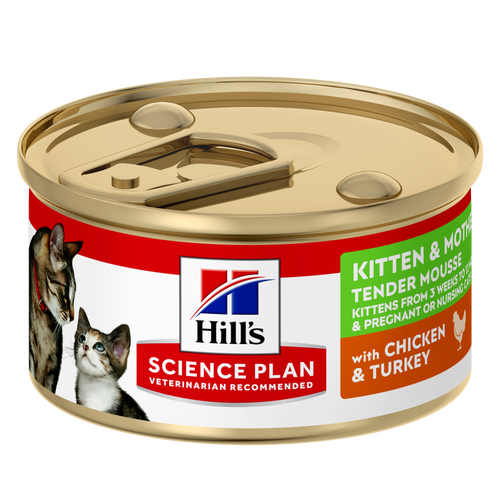
Hill's Science Plan Kitten & Mother Tender Mousse Cat Food with Chicken & Turkey is a complete premium pet food for kittens from weaning until 1 year old and for pregnant and nursing cats. Formulated with chicken, turkey and other specially selected ingredients to support gut health and optimal growth. It comes in a soft mousse texture they'll love.

HILL'S SCIENCE PLAN Hypoallergenic Adult cat food with egg & insect protein is a complete pet food for adult cat 1–6 years old. It's formulated for cats with delicate skin and stomach, with limited high quality novel protein sources & no grain.

Hill's Science Plan Oral Care Adult Cat Food with Chicken contains clinically proven kibble technology to reduce plaque & tartar build up.

Hill's Science Plan Adult Sterilised Cat Dry Food with Chicken is specially formulated with ActivBiome+ Multi-Benefit Technology. It is a precisely balanced nutrition, tailored to meet the needs of sterilised cats, to help keep sthem lean & healthy.
Related articles
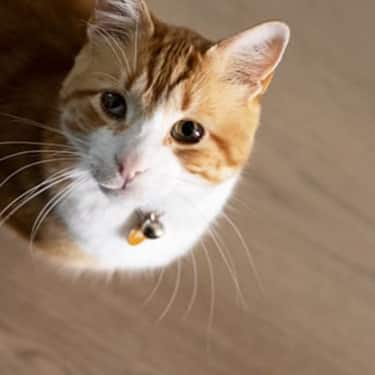
Learn how to spot the signs of a skin condition in your cat and the steps to take for their wellbeing. For comprehensive care advice, visit Hill's Pet.
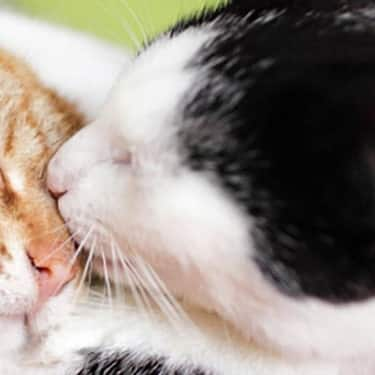
Learn the different factors that might be contributing to your cat's weight gain, and how bigger doesn't always mean better.
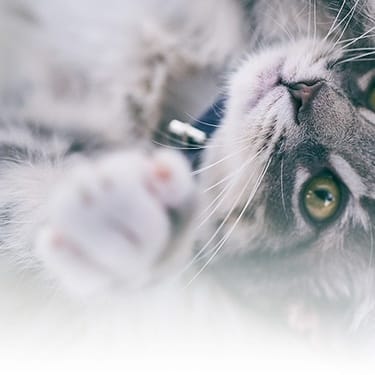
South African vets say more than half the patients they see are overweight. Learn more about managing your cat’s weight.

While hairballs are a common occurrence of cats, there are steps you can take to help them manage their problem and keep them healthy.

Put your cat on a diet without them knowing
Our low calorie formula helps you control your cat's weight. It's packed with high-quality protein for building lean muscles, and made with purposeful ingredients for a flavorful, nutritious meal. Clinically proven antioxidants, Vitamin C+E, help promote a healthy immune system.
Put your cat on a diet without them knowing
Our low calorie formula helps you control your cat's weight. It's packed with high-quality protein for building lean muscles, and made with purposeful ingredients for a flavorful, nutritious meal. Clinically proven antioxidants, Vitamin C+E, help promote a healthy immune system.

